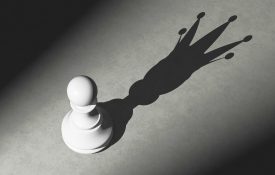-

Why Narcissistic Leaders Are Prone to Overconfidence
Research suggests that overconfidence is strongly linked with narcissism and is particularly likely to emerge when highly narcissistic people feel powerful.
-
The Friendship That Created Behavioral Economics
The Atlantic: The term “the economic man,” or homo economicus, is attributed to John Stuart Mill. It represents one way economists have studied people for decades—as rational, self-interested actors whose behaviors and actions can be modeled. But then came the psychologists. Daniel Kahneman and Amos Tversky are often referred to as the fathers of behavioral economics, for demonstrating that the human brain relies on mental shortcuts and biases in decision-making, which often leads people to irrational ends.
-
To Rate How Smart Dogs Are, Humans Learn New Tricks
The New York Times: Pam Giordano thinks her dog is quite intelligent, and she has proof: Giorgio, an 11-year-old Havanese, has diplomas stating he has a bachelor’s, master’s and Ph.D. from Yale. The bumper sticker on Ms. Giordano’s car announces, “My dog made it to the Ivy League.” The honors were bestowed on Giorgio and Giuliana, his sibling, for participating in the university’s Canine Cognition Center. “I wanted to know how much they know and how smart they are,” Ms. Giordano, a real estate broker in Branford, Conn., said. “I think Giuliana really just goes for the treats. But Giorgio rises above it. He is very bright. I would say he knows over 100 words.” ...
-
Using Smartphones For Smarter Social Science
NPR: On Jan. 9, 2007, 10 years ago today, Steve Jobs formally announced Apple's "revolutionary mobile phone" — a device that combined the functionality of an iPod, phone and Internet communication into a single unit, navigated by touch. It was a huge milestone in the development of smartphones, which are now owned by a majority of American adults and are increasingly common across the globe. As smartphones have proliferated, so have questions about their impact on how we live and how we work. Often the advantages of convenient, mobile technology are both obvious and taken for granted, leaving more subtle topics for concerned discussion: Are smartphones disturbing children's sleep?
-
Loneliness Can Be Deadly for Elders; Friends Are the Antidote
The New York Times: The circle shrinks. As the years pass, older people attend too many funerals. Friendships that sustained them for decades lapse when companions and confidants retire or move away or grow ill. These days Sylvia Frank, who moved into an independent living residence in Lower Manhattan in 2014, can email or call one longtime friend in Florida. Another, in Queens, is slipping into dementia and will most likely exclaim, “I haven’t spoken to you in months!” when, in fact, they talked the day before. ... The way we prioritize friendships may evolve.
-
Why It Pays to Be Vague When Negotiating Prices
LiveScience: In negotiating, is a more precise opening offer always better? It might be — but it depends on the experience level of the person with whom you're negotiating, a recent study from Germany found. In the study, researchers showed that increasing the precision of an opening offer improved a person's negotiations with amateurs, but could actually backfire on negotiations with experts. In most situations, precision can influence social perceptions during a negotiation, suggesting more confidence and competence, the researchers wrote in their study, which was published in October in the journal Psychological Science. Read the whole story: LiveScience

